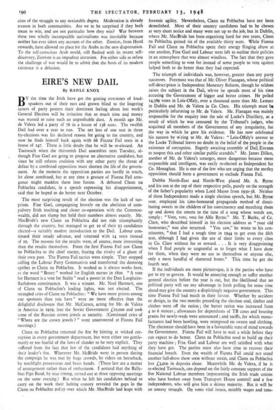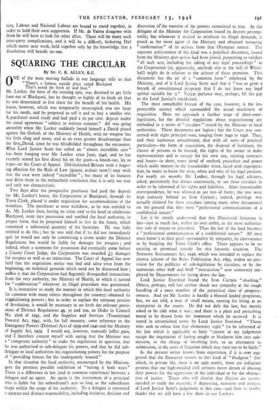EIRE'S NEW DAIL
By RAWLE KNOX BY the time the Irish have got the grating overtones of loud- speakers out of their ears and grown blind to the lingering tatters of party posters their dominant feeling about last week's General Election will be irritation that so much time and money was wasted to raise such an unprofitable dust. A month ago Mr. de Valera led a party of 76 in a house of 138 seats. The twelfth Dail had over a year to run. The net loss of one seat in three by-elections was his declared reason for going to the country, and now he finds himself back again with 68 Fianna- Fail seats in a house of 147. There is little doubt that he will be re-elected. An Taoiseach when the thirteenth Dail assembles next Tuesday, al- though Fine Gael are going to propose an alternative candidate, but since he still refuses coalition with any other party the threat of defeat by a combined opposition must shorten the life of the govern- ment. At the moment the opposition parties are hardly in touch, let alone combined, but at any time a gesture of Fianna Fail arro- gance might madden them into fusion. A defeated Claim na Poblachta candidate, in a speech expressing his disappointment, said that he hoped to do better next October.
The most surprising result of the election was the lack of sur- prises. Fine Gael, campaigning bravely on the abolition of com- pulsory Irish teaching and closer co-operation with the Common- wealth, did not slump but held their numbers almost exactly. Mr. MacBride's new Claim na Poblachta did not ride triumphantly through the country, but managed to get to of their 93 candidates elected—a suitably modest introduction to the Dail. Labour con- tinued their steady advance, and returned with 14 seats instead of to. The reasons for the results were, of course, more interesting than the results themselves. From the first Fianna Fail saw Clann na Poblachta as the chief enemy, fearing the rivalry of a ghost of their own past. The Fianna Fail tactics were simple. They stopped calling the Labour Party Communists and transferred the damning epithet to Clann na Poblachta. It worked as it always works here, as the word " Boney " worked for English nurses in 1800. "A vote for Hartnett is a vote for Stalin" read a poster in the Dun Laoghaire- Rathdown constituency. It was a winner. Mr. Noel Hartnett, one of Clann na Poblachta's leading lights, was not elected. The strangled cries of Clann na Poblachta : "We have more priests among our sponsors than you have" were no more effective than the delightful disclosure that Mr. McCarten, acting for Mr. de Valera in America in 1919, lent the Soviet Government £to,000 and took some of the Russian crown jewels as security. (Continued cries of "Where are the crown jewels ? " went unanswered at Fianna Fail meetings.)
Clann na Poblachta returned the fire by hinting at wicked cor- ruption in every government department, but were either too gentle- manly or too fearful of the laws of slander to be very explicit. They suffered from the fact that few of the candidates had anything of their leader's fire. Wherever Mr. McBride went in person during the campaign he was met by huge crowds, by riders on horseback, by torchlight processions and brass bands. (These last are a matter of arrangement rather than of enthusiasm. .I noticed that the Bally- finn Pipe Band, by nice timing, turned out at three opposing meetings on the same evening.) But when he left his candidates behind to carry on the work their halting oratory revealed the gaps in the Clann na Poblachta policy over which Mr. MacBride had leapt with forensic agility. Nevertheless, Clann na Poblachta have not been demolished. Most of their country candidates had to be chosen at very short notice and many were not up to the job, but in Dublin, where Mr. MacBride has been organising hard for two years, Claim na Poblachta gained six of the available thirty seats. While Fianna Fail and Clann na Poblachta spent their energy flinging abuse at one another, Fine Gael and Labour were left to outline their policies in an atmosphere that was almost windless. The fact that they gave people something to vote for instead of some people to vote against helped both to do better than they had expected.
The triumph of individuals was, however, greater than any party successes. Foremost was that of Mr. Oliver Flanagan, whose political self-description is Independent Monetary Reform, though he seldom raises the subject in the Dail, whtre he spends most of his time accusing the Government of bigger and better crimes. He polled 14,369 votes in Leix-Offaly, over a thousand more than Mr. Lemass in Dublin and Mr. de Valera in Co. Clare. His triumph must be particularly infuriating to Mr. de Valera. Mr. Flanagan was mainly responsible for the enquiry into the sale of Locke's Distillery, as a result of which he was censured by the Tribunal's judges, who acquitted all members of the Government of any irregularity, for the way in which he gave his evidence. He has now celebrated his success by wiring to Mr. de Valera : " Leix-Offaly's answer to the Locke Tribunal leaves no doubt in the belief of the people in the existence of corruption. Eagerly awaiting assembly of Dail. Eireann to reopen this and other similar public scandals." Mr. James Dillon, another of Mr. de Valera's scourges, more dangerous because more responsible and intelligent, was easily re-elected as Independent for Co. Monaghan. He is one of the few who are urging that the motley opposition should form a government to exclude Fianna Fail.
Dublin North-East and North-West placed Mr. A. Byrne and his son at the top of their respective polls, purely on the strength of the father's popularity when Lord Mayor from 1930-38. Neither of these Independents made a single election speech, but Mr. Byrne senr, employed his time-honoured propaganda method of distri- buting sweets to the children of his constituency and marching them up and down the streets to the tune of a song whose words are, simply : "Vote, vote, vote for Alfie Byrne." Mr. T. Burke, of Co. Clare, who described himself in his election address as "your old bonesetter," was also returned. "You saw," he wrote to his con- stituents, "that I had a tough time in 1944 to get even the fifth seat, although I had given the use of their limbs to every class in Co. Clare without fee or reward. . . . It is very disappointing when I find people so ungrateful as to forget what I have done for them, when they were no use to themselves or anyone else, only a mere handful of shattered bones." This time he got the fourth seat.
If the individuals are more picturesque, it is the parties who have got to try to govern. It would be annoying enough to suffer another general election before the year is out, but the- likelihood that no political party will see any advantage in fresh polling for some time ahead may give the country a dispiritingly negative government. This time Fianna Fail had much in their favour. Whether by accident or design, in the two months preceding the election coal, timber and clothes went off the ration ; the butter ration was increased from 4 to 6 ounces ; allowances for dependants of TB cases and housing grants for newly-weds were announced ; and tariffs, for which manu- facturers had been howling, were reimposed on sweets and clothing. The electorate should have been in a favourable state of mind towards the Government. Fianna Fail will have to wait a while before they can expect to do better. Clann na Poblachta need to build up their party machine ; Fine Gael and Labour are well satisfied with what they have got. The parties must also have time to recover their financial breath. Even the, wealth of Fianna Fail could not stand another full-dress show soon without strain, and Clann na Poblachta lost £3,4500 in deposits alone. Meanwhile Mr. de Valera, if he is re-elected Taoiseach, can depend on the fairly constant support of the five National Labour members (representing the Irish trade unions who have broken away from Transport House control) and a few independents, who will give him a skinny majority. But it will be an uneasy struggle. On some vital issues, notably wages and taxa- tion, Labour and National Labour are bound to stand together, in order to hold their own supporters. If Mr. de Valera disagrees with them he will have to look for other allies. There will be many such inter-party complications, and it will be a difficult, bickering Dail which meets next week, held together only by the knowledge that a dissolution will benefit no one.



































 Previous page
Previous page